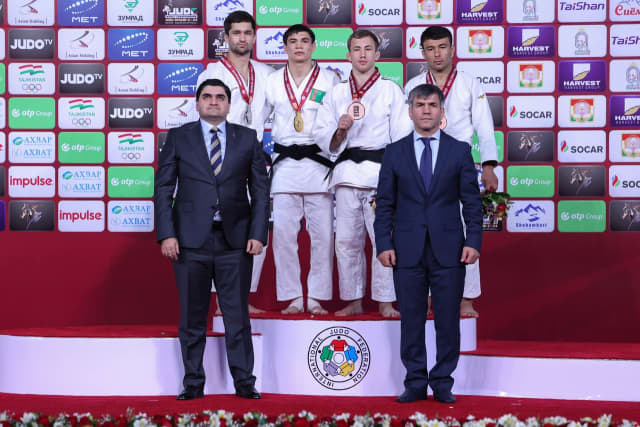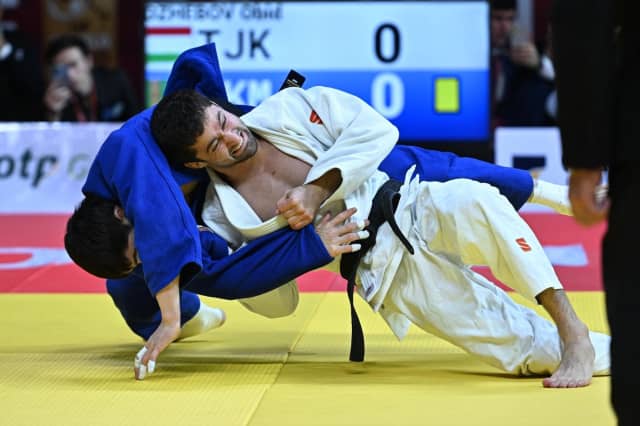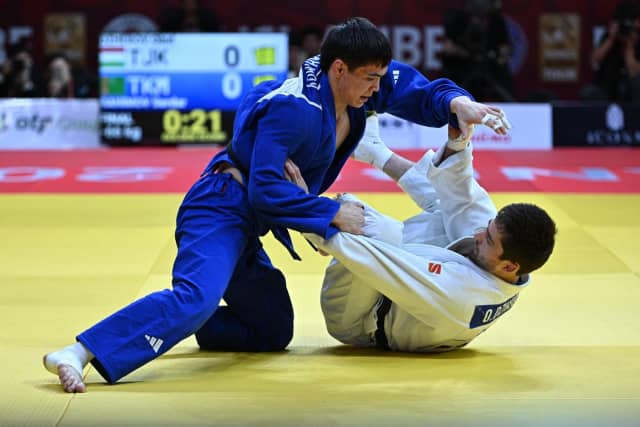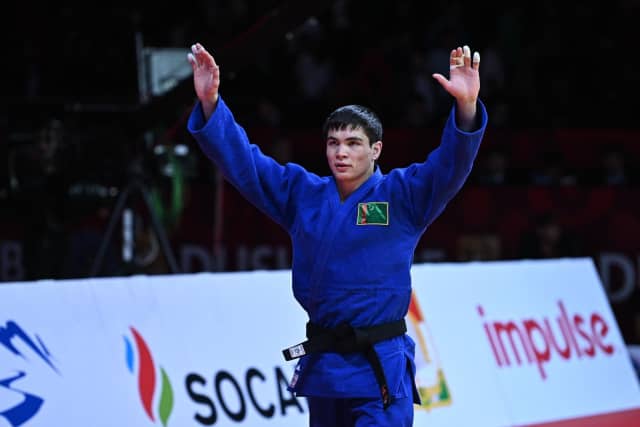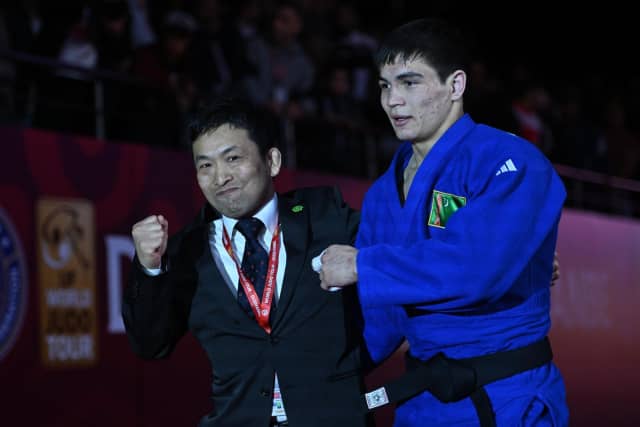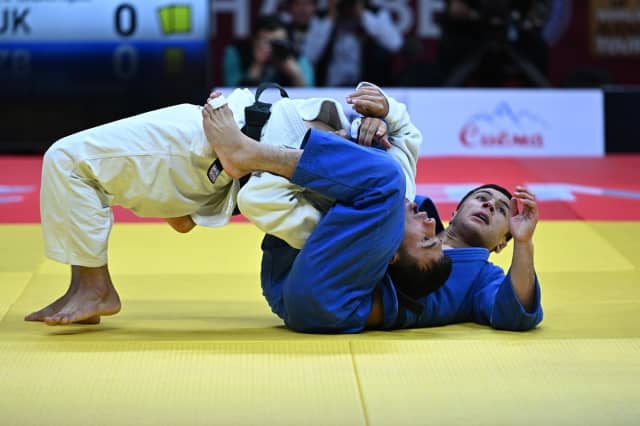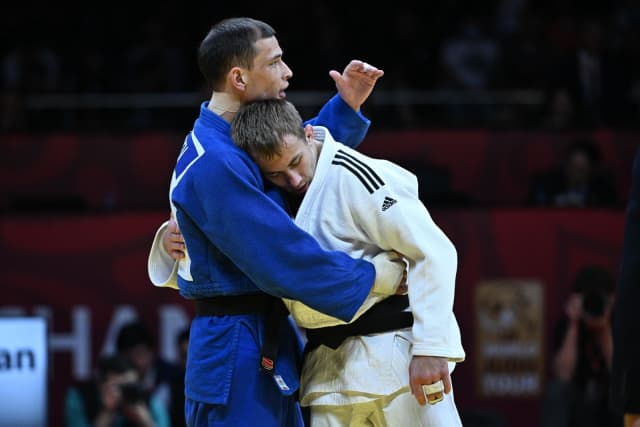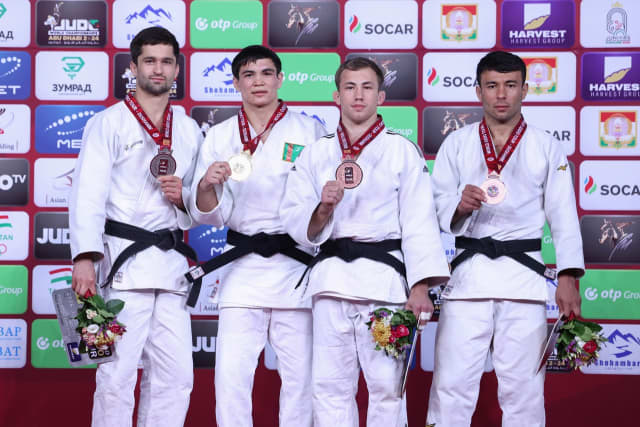From the outset Dzhebov was the embodiment of composure. In round 1 against Lkhagvasuren (MGL), he scored two waza-aris in just over a minute using first seoi-nage and later kata-guruma. In his quarter-final against Galymov (KAZ), he used a combination of sumi-gaeshi and uchi-mata to throw his opponent one way and then the other to score waza-ari and ippon, respectively, in just under two minutes, to set up a semi-final with Nutfulloev.
The 22-year-old Uzbek fighter was ranked a distant 137 in the world at the start of the event but impressed with his open and attacking judo, defeating not just Khyar in round 2 but also the Tbilisi Grand Slam 2024 winner Ivan Chernykh (AIN) in the quarter-final stages. Despite his excellent form, Nutfulloev was no match for Dzhebov, who threw him for waza-ari in just 30 seconds with an unusual sumi-gaeshi. A third penalty for Nutfulloev with 30 seconds remaining sealed the deal for Dzhebov, who advanced confidently to the final.
In the opposite half of the draw, none of the seeded players reached the quarter-final stages. In round 2, the number two seed Baul An (KOR) fell at the hands of Abrek Naguchev (AIN), while third seed Elios Manzi was bested by the hosts’ Mulorajab Khalifaev (TJK). Khalifaev met Serdar Rahimov (TKM) in the quarter-final after two tactical victories for the latter in the early rounds. It was a back-and-forth contest that was ended prematurely by a head dive and disqualification for the Tajik athlete.
In the semi-final Rahimov met Bobur Vadjiev (UZB) who, much like compatriot Nutfulloev, was world-ranked number 135 at the start of the day, but impressed with his throwing abilities. Another sage tactical victory for Rahimov put him through to the final to face Dzhebov and, in doing so, he became the first ever athlete from Turkmenistan to reach a grand slam final.
The final was an intriguing and intense contest. Dzhebov came close to scoring with yoko-tomoe-nage early on and an extended ne-waza exchange saw him twice come close to freeing his entangled leg to pin Rahimov but Turkmenistan’s fighter was able to hold on. Each judoka had picked up two penalties as the fight entered golden score, and gradually Rahimov turned the tide on his opponent. After four attacks with no response from Dzhebov, the Tajik man was awarded his third and final penalty for passivity.
Rahimov makes history as the first judoka from Turkmenistan to win a grand slam gold medal. Not only that, he surpasses his fellow countryman Hekim Agammamedov in the Olympic rankings and goes straight into a direct qualification position.
Chernykh and Vadjiev faced off in the first bronze medal contest and the result was a tactical victory for Chernykh. Two attacking errors from Vadjiev saw the Uzbek pick up three penalties to Chernykh’s one after less than three minutes and the Individual Neutral Athlete strolled to his second grand slam medal in a row.
The second bronze medal was settled between Khalifaev and Nutfulloev. The contest started slowly but came alive at the end of the second minute. Khalifaev attacked strongly with harai-tsurikomi-ashi and Nutfulloev almost countered with sumi-otoshi but no score was given. The following exchanges featured a flurry of attacks from both players and eventually Khalifaev threw a distracted Nutfulloev with a huge tsuri-goshi to soto-makikomi combination to score waza-ari. Despite an onslaught from the Uzbek in the final minute, Khalifaev survived to take his second grand slam medal, following his silver in the Baku Grand Slam 2022.
